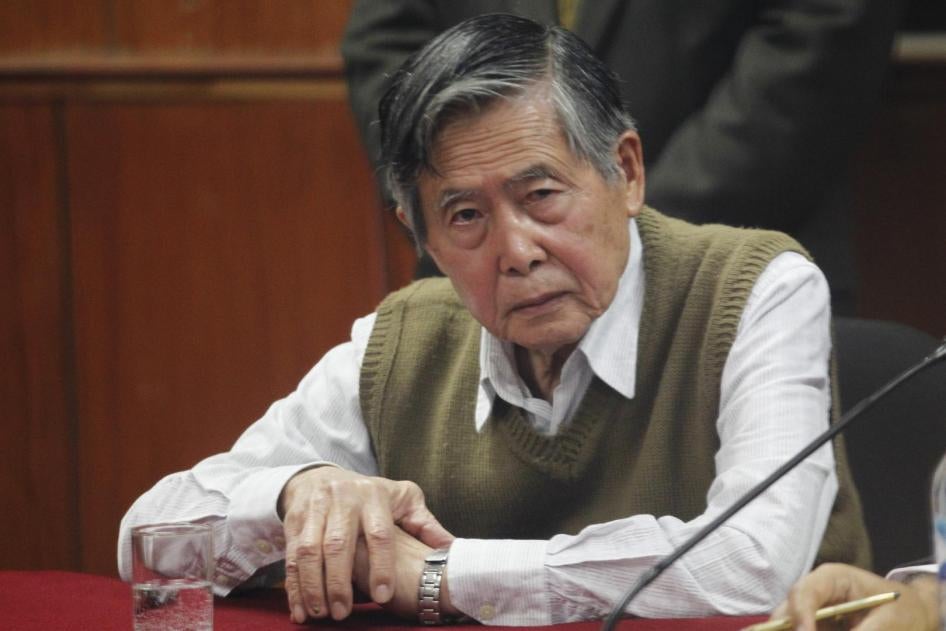This article was published in five newspapers in Latin America.
Leaders in the Americas have often been confronted in recent years with hard questions about accountability and prisoners’ rights. Should people imprisoned for the most serious human rights violations have the same opportunities for release as other prisoners? Should they remain in prison even when they suffer serious illnesses? Should they benefit from conditional release rules that are available to other prisoners?
Peruvians have waded into the debate. Late last year, then-President Pedro Pablo Kuczynski granted a “humanitarian pardon” to former President Alberto Fuijmori, who was serving a 25-year sentence for his role in extrajudicial killings, abductions, and enforced disappearances. Kucyznski contended that the release was to protect Fujimori’s health. But there was strong reason to believe that the pardon was part of a negotiation to allow Kucyznski to avoid impeachment.
Hours after Fujimori’s pardon, the lawyer of Abimael Guzman, the imprisoned leader of Shining Path—a leftist group that battered regions of Perú for decades—requested that his client be released as well. In early October, a Supreme Court judge overturned the Fujimori pardon alleging it undermined victims’ rights.
The debate has also taken place in Argentina and Chile, where soldiers and officers convicted of crimes against humanity committed during dictatorships in the 1970s are aging in prison.
In Argentina, official statistics indicate that 117 people over age 70 are serving prison time for dictatorship-era crimes —most of them in pre-trial detention. But the Criminal Code allows judges to send inmates over 70 to serve their time in house arrest.
In Chile, the debate was revived when, in late July, the Supreme Court granted conditional release to five officers convicted of abuses committed during the dictatorship of Augusto Pinochet. The court considered that the detainees had fulfilled the requirements for conditional release under Chilean law, which include serving at least half of their sentence. Many commentators said that the releases undermined victims’ rights. And a group of lawmakers initiated a process to have the three judges who ruled on these cases impeached.
Whatever the particular history and politics swirling around each case in each country, the debate highlights values that are fundamental to the protection of human rights.
Victims’ rights groups have often demanded more accountability and rejected the release of rights violators. They rightly point out that sentences that are grossly or manifestly inadequate given the gravity of these crimes would not constitute real accountability and deprive victims of the meaningful justice they deserve.
On the other hand, many observers have argued that denying release to someone convicted of grave abuses—when others would be granted release under similar circumstances—violates a prisoner’s rights. This argument reflects the basic principle that everyone, including those responsible for the worst atrocities, deserves fair and just treatment during detention, as well as the possibility of release when circumstances warrant it. This is all the more important when considering prisoners who suffer serious illnesses.
The path forward requires striking a balance between the two values at stake. Judges and authorities considering the release of prisoners should weigh the rights of both detainees and victims. The state, and society, have strong and important interests in ensuring real accountability for serious human rights violations. On the other hand, serious illness can transform an ordinary sentence of incarceration into an ordeal that is cruel and punitive to a degree that outweighs those interests.
The Inter-American Court of Human Rights, when analyzing Fujimori’s release, held that ill people convicted for atrocities can receive benefits that a judge deems strictly necessary to protect their health. When their health is not at risk, they can benefit from conditional release rules available to other convicts, provided that the justice delivered, ultimately, is proportionate to the gravity of the crimes.
Likewise, a convict’s decision to confess, cooperate with justice, or ask for forgiveness can be taken into consideration when deciding on prisoners’ release. Yet governments sometimes jumble the principles at stake. Consider a bill introduced in Chile in January that would force a terminally ill prisoner who is seeking release to repent: that is bad policy and could create situations of cruel and inhumane treatment.
As countries in the Americas depart from the cruel dictatorships that once cowed the region, they must keep working to ensure that victims of atrocities receive the justice they deserve. But that does not mean that justice can only be served when a criminal dies in prison.
Jose Miguel Vivanco is America’s director and Juan Pappier is an Americas researcher at Human Rights Watch.










